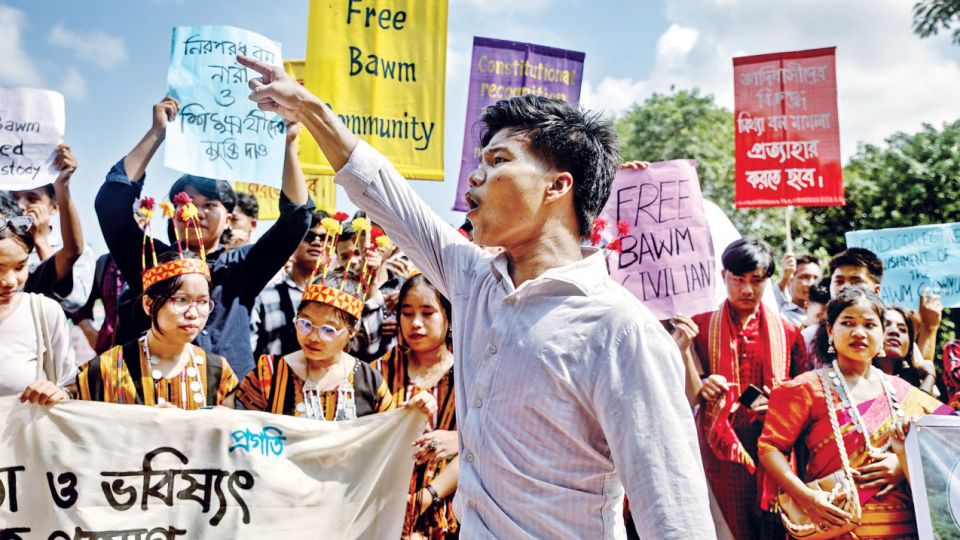August 11, 2025
DHAKA – Bangladesh’s indigenous peoples continued to face grave risks in the first seven months of the year despite expectations of an improvement following the July uprising, according to a report by Kapaeeng Foundation.
From January to July, the rights organisation for indigenous people of Bangladesh documented alarming incidents of land grabbing, criminalisation, sexual violence, torture, arbitrary detention and harassment, particularly in the Chittagong Hill Tracts (CHT).
Both state and non-state actors were involved in many of the violations, said the report, which was released yesterday on the occasion of the International Day of the World’s Indigenous Peoples.
On January 16, a mob attack in Dhaka by a group calling itself “Students for Sovereignty” left at least 18 indigenous students critically injured.
While five suspects were arrested, three were later released on bail, and no trial has yet taken place.
The organisation recorded 24 cases of violence against indigenous women during the period, with 21 of them taking place in the CHT.
Victims included four women, of whom two were gang-raped and two killed after rape. Seven women were sexually harassed, five were targeted in attempted rape, one was molested and three were tortured.
Police filed six cases and arrested 12 suspects in connection with the incidents.
As many as 295 people were affected in 15 land-related incidents, with cases reported from Naogaon, Sylhet, Rajshahi, Rangamati, Bandarban, Chittagong and Cox’s Bazar.
These included alleged attempts to establish a security camp on indigenous land in Barkal, occupy 130 acres of Jum and fruit plantations belonging to 39 families and seize a Buddhist temple site after cutting down 300 trees.
Private companies were also accused of land grabbing.
The report documented 170 victims in 32 incidents of civil and political rights violations, including arbitrary arrests, detention, beatings, house raids, threats and forced religious conversion.
In one case, 30 indigenous children were reportedly converted to Islam.
Kapaeeng warned of a “deep-seated culture of impunity” that emboldens perpetrators.
It cited past attacks — from the killing of three Santal men in Gobindaganj in 2016 to the torching of the CHT Regional Council office in 2024 — as examples where justice has been slow or absent.
The organisation urged the government to ensure independent investigations, prosecute perpetrators to the fullest extent of the law and protect the rights and dignity of indigenous communities.
Last year’s July uprising aimed to eliminate all forms of discrimination, Pallab Chakma, founder of the Kapaeeng Foundation, told The Daily Star.
“But what we have seen is that we remain just as vulnerable as we were since Independence. We were excluded during the drafting of the 1972 Constitution, and even after the July uprising, we continue to be excluded.”
There was no representation of indigenous people in the major reform commissions, including the Constitution Reform Commission, he said.
“What have we demanded? We have only demanded constitutional recognition. Is that too much to ask?”
The indigenous community is worse off since the interim government assumed office, Chakma said.
“Our girls were raped and murdered. Our people were killed. Our lands were grabbed. Attempts were made to incite communal violence across the Chittagong Hill Tracts. But have we received justice for any of these incidents?”
He demanded that the government bring all perpetrators to justice, ensure both accountability and constitutional recognition for the indigenous communities and ensure all the rights they are entitled to.
The interim government did not even include a single word regarding indigenous communities in the much-discussed July Declaration, said Dipayon Khisa, a central committee member of Parbatya Chattogram Jana Samhati Samiti.
“As far as we know, there is no such clause that mentions indigenous issues in the July Charter formulated by the National Consensus Commission. The commission did not even invite any group representing indigenous communities. Even the government, which claims to be working for national reform, appears indifferent to our issues.”


